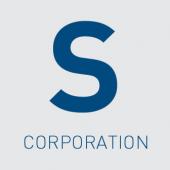S-Corporations

S-Corporations
S-Corporation enjoy many of the same benefits of a C-Corporation (e.g. shareholder limited liability, separate legal entity, perpetual existence), but they are treated differently for tax purposes. A S-Corporation is a pass-through legal entity for tax purposes, meaning that the owners report the businesses profits or losses on their individual tax returns. In other words, S-Corporations avoid “double taxation” on corporate income.
To form a S-Corporation, you must file IRS Form 2553, which is an election to be taxed under S subchapter of the Internal Revenue Code. There are certain restrictions for S-Corporation eligibility, such as having no more than 100 shareholders, having one class of stock, and the shareholders have to be individuals (with some exceptions). For more information, see http://www.irs.gov/Businesses/Small-Businesses-&-Self-Employed/S-Corporations
If your business will be formed by individuals licensed to perform professional services, then you should consider forming a Professional Corporation (P.C.). The shareholders, directors, and most officers must be individual licensed professionals. Professional Corporations may elect, for tax purposes, to be treated as a C-Corporation or an S-Corporation.
We can help you decide if a C-Corporation is the right choice of entity for your business.
